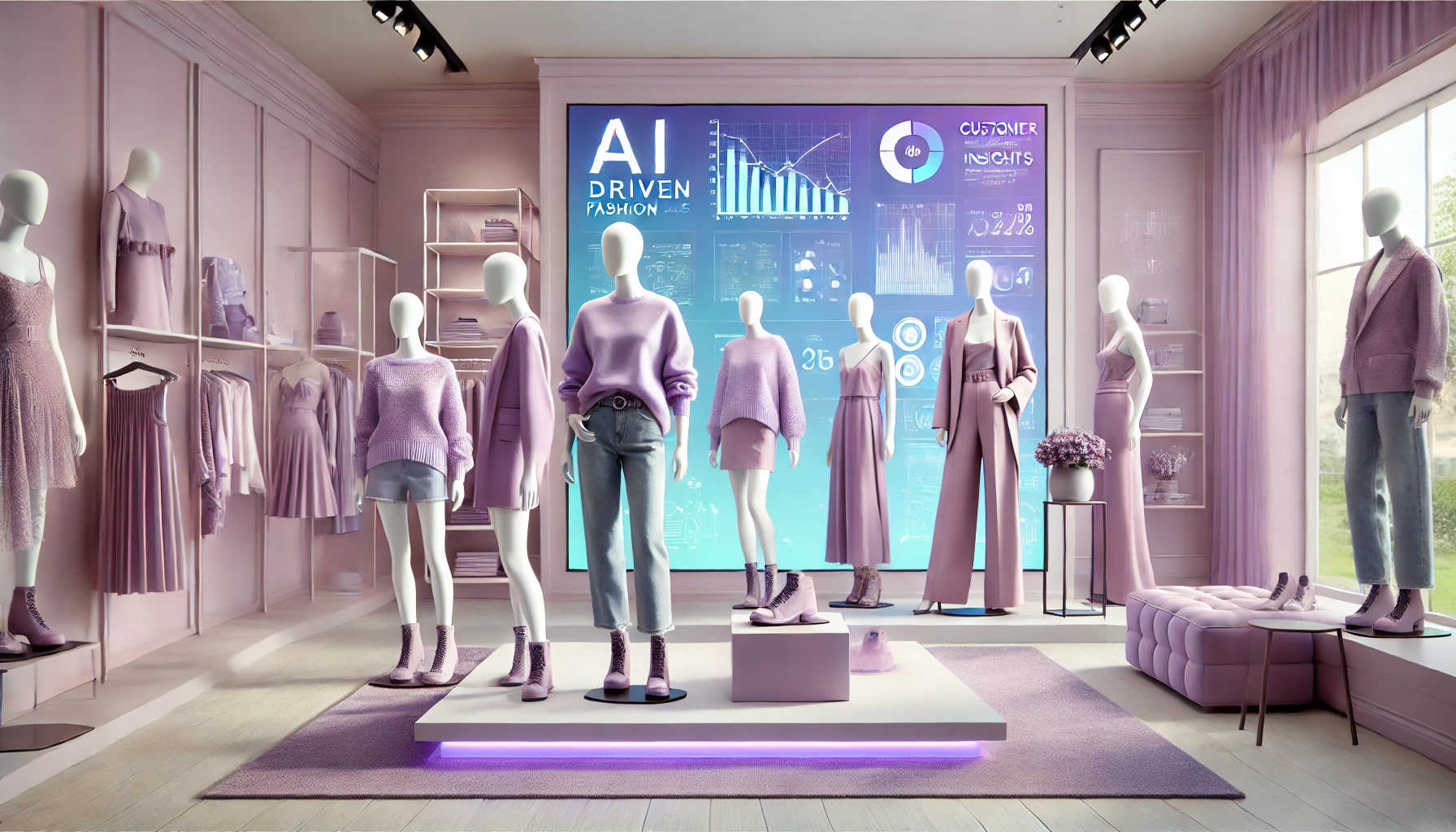Top Fashion Brands Leveraging Artificial Intelligence
Explore how leading fashion brands use AI to transform personalization, production, and customer experiences.


Top Fashion Brands Leveraging Artificial Intelligence
In today’s fast-paced fashion industry, leading brands are increasingly turning to artificial intelligence (AI) to stay ahead of the curve and enhance their operations. From personalizing customer experiences to optimizing supply chains, AI is revolutionizing the way fashion companies approach design, marketing, and sales. This introduction explores how top fashion brands are harnessing AI to drive innovation, improve efficiency, and deliver more personalized and dynamic fashion experiences. By integrating cutting-edge technologies, these industry leaders are setting new standards and redefining what’s possible in the world of fashion.
💡 Running a fashion brand? Payments shouldn’t be your blind spot. At Redde Payments we make sure you get paid fast, with no surprises. Talk to a Payments Rep Today!
What is AI in the fashion industry?
Artificial Intelligence (AI) in the fashion industry involves applying sophisticated technologies to analyze data and automate various business functions. This includes personalizing shopping experiences, forecasting trends, managing inventory, and enhancing design and production. By utilizing machine learning, computer vision, natural language processing, and augmented reality, AI helps fashion brands innovate, improve efficiency, and offer more customized and effective services to their customers.
How is AI transforming the fashion industry?
Artificial intelligence (AI) is making significant strides in the fashion industry, transforming various aspects of the business through the following ways:
· Customized Shopping Experiences: AI leverages customer data to offer personalized product recommendations, enhancing the online shopping journey with tailored suggestions based on individual preferences and past behaviors.
· Trend Prediction: AI analyzes data from social media, fashion shows, and historical patterns to forecast future fashion trends, allowing brands to anticipate and adapt to emerging styles.
· Inventory Optimization: AI improves inventory management by predicting demand, helping brands avoid overstocking or shortages and streamlining supply chain operations.
· Virtual Fitting Rooms: Augmented reality (AR) and AI technologies enable virtual try-ons, letting customers see how clothes will look on without trying them on physically, which can reduce return rates.
· Design Innovation: AI assists designers by generating creative ideas, automating routine tasks, and analyzing design trends, thus supporting and inspiring the design process.
· Enhanced Customer Service: AI-powered chatbots and virtual assistants provide instant, personalized support, improving overall customer service and interaction.
· Sustainable Practices: AI contributes to sustainability by optimizing material use, predicting garment life cycles, and identifying environmentally friendly alternatives.
In summary, AI is driving progress in the fashion industry, making it more efficient, responsive, and attuned to customer needs.

Top 11 Examples of Fashion Brands leveraging the Power Of AI
1. Winnifiers:
Winnifiers is a company that sells t-shirts with special quotes on them. The quotes are funny and inspiring and can be found online through their ecommerce store. Actually, Winnifiers uses AI to personalize the customer experience, optimize marketing efforts, improve product design, enhance supply chain efficiency, and provide better customer service through chatbots. This allows them to offer tailored recommendations, target the right audience, create innovative products, streamline operations, and provide timely assistance to customers.

2. Zara:
Zara utilizes AI to forecast fashion trends and manage inventory. By analyzing social media and sales data, Zara anticipates trends and adjusts its stock to stay aligned with the latest styles and reduce waste.
3. H&M:
H&M employs AI for a personalized shopping experience via its app, recommending products based on past purchases and browsing history to create a more tailored and engaging user experience. Additionally, H&M leverages AI to enhance sustainability efforts by optimizing recycling processes, predicting garment lifecycles, and minimizing waste, contributing to their broader commitment to environmental responsibility.
💡 Want to spend less time chasing payments and more on design? Try Redde Payments.
4. Stitch Fix:
Stitch Fix relies on AI to provide personalized fashion recommendations that cater to individual tastes and preferences, enhancing the overall shopping experience. Advanced AI algorithms meticulously analyze customer profiles, taking into account factors such as style preferences, past purchases, and current fashion trends to suggest outfits, which are then fine-tuned by expert human stylists to ensure the perfect match in both style and fit, ultimately offering a seamless blend of technology and personalized service.

5. Nike:
Nike integrates AI into its Nike Fit app to accurately measure foot size and recommend suitable shoes, improving the shopping experience. AI also supports product design by analyzing athlete data to develop performance-boosting innovations.
6. Levi’s:
Levi's uses AI-driven chatbots to assist with customer inquiries, offering instant responses about products and sizing, which improves customer satisfaction and reduces wait times. AI also helps Levi’s analyze customer feedback to enhance its offerings, identifying trends and areas for improvement to stay ahead of customer needs. Additionally, AI-driven data analytics enable Levi’s to refine inventory management, ensuring popular items are always in stock while minimizing overproduction. This technology-driven approach not only enhances the shopping experience but also aligns with Levi’s commitment to efficiency and sustainability.
💳 No payments headaches? That’s our specialty. Get signed up today!
7. ASOS:
ASOS features AI-powered visual search, enabling customers to upload images of clothing they like and find similar items on its site, making it easier to locate desired products with just a few clicks. This innovative tool not only streamlines the shopping experience but also allows customers to explore a wider range of options by instantly matching styles and patterns. Additionally, ASOS uses AI to analyze browsing behavior and preferences, delivering personalized recommendations that enhance customer engagement and satisfaction. By integrating AI into its platform, ASOS continues to set trends in online fashion retail, offering a seamless and intuitive shopping journey.

8. Burberry:
Burberry implements AI to analyze social media trends and customer behavior, helping to create targeted marketing campaigns and personalized content, which boosts customer engagement and conversion rates.
9. Adidas:
Adidas utilizes AI to design custom sneakers, ensuring each pair reflects the unique style and preferences of the individual customer. Machine learning analyzes consumer preferences and trends to create personalized designs and streamline production, allowing for faster turnaround times and reducing waste. Additionally, AI-driven data insights help predict future fashion trends, enabling the brand to stay ahead in a competitive market. This blend of technology and creativity not only enhances customer satisfaction but also fosters innovation in sneaker design.
10. Prada:
Prada incorporates AI into its customer service with virtual assistants that provide tailored shopping advice and support, ensuring a personalized and seamless experience for every customer. AI also helps Prada understand customer preferences and buying habits, allowing the brand to anticipate trends and customize offerings to meet evolving demands. Additionally, this technology enables Prada to optimize inventory management by predicting which products will be in high demand, reducing the risk of overstock or shortages. By integrating AI across its operations, Prada enhances both customer satisfaction and operational efficiency, reinforcing its position as a leader in luxury fashion.

11. Farfetch:
Farfetch leverages AI for dynamic pricing and personalized recommendations on its platform. AI adjusts prices based on demand and offers product suggestions based on individual shopping behavior.
These brands showcase how AI can enhance various facets of the fashion industry, from trend prediction and inventory management to personalized shopping and customer service.
Conclusion:
Artificial intelligence is transforming the fashion industry by revolutionizing supply chains, enhancing personalization, and elevating marketing strategies. Brands like Valentino and Moncler are redefining their brand campaigns, while Nike and H&M are crafting more personalized shopping experiences, showcasing the diverse applications of AI in fashion.
As fashion brands harness the full potential of AI, they unlock new opportunities to boost creativity, foster customer loyalty, and deliver seamless, engaging experiences. The key to standing out in this digital era will be how effectively brands use these technologies to remain agile and authentically connect with their audiences.
You’ve seen how AI is transforming fashion. Now transform how you get paid.👉 Be Redde Today — Start Here
Join our mailing list
Stay in the loop with helpful tips, industry updates, and insights designed to keep your business moving forward.
.png)


